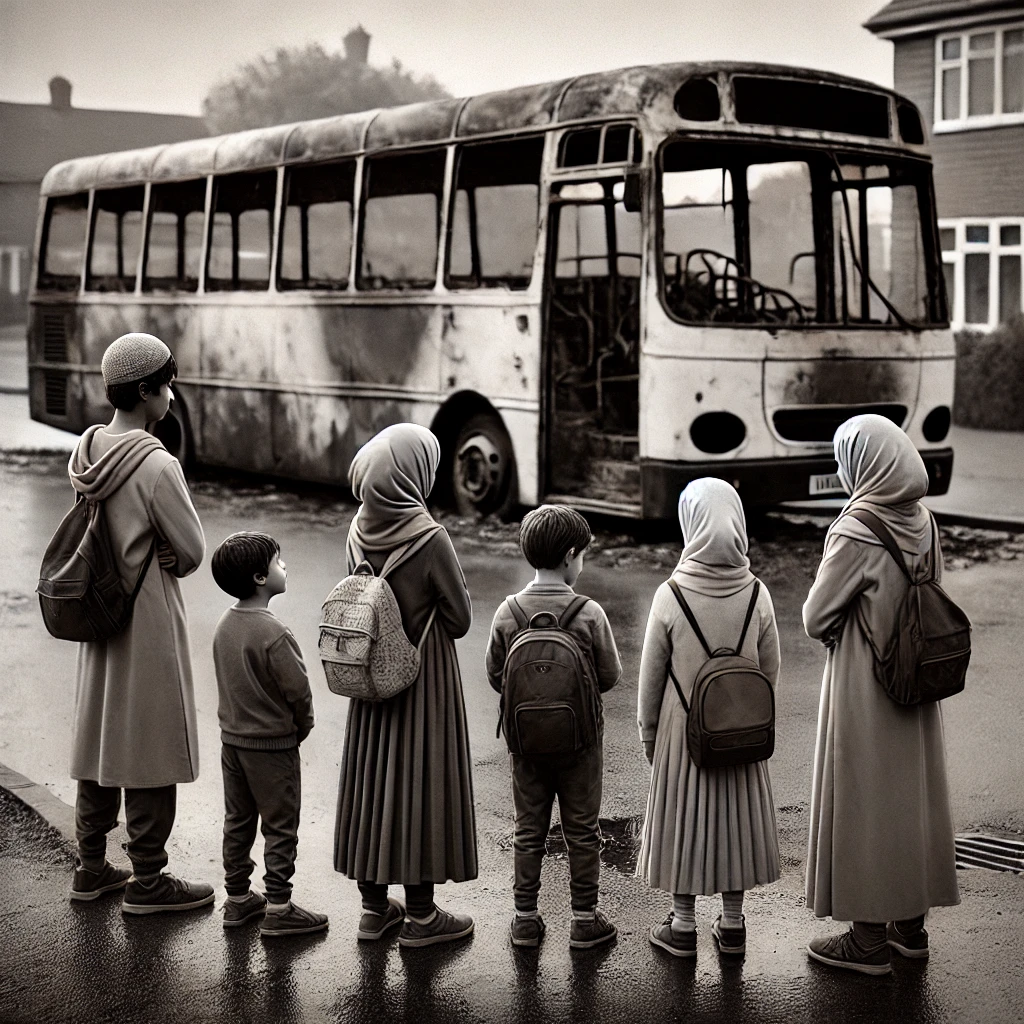
There are fires that scorch the earth, and there are fires that burn the soul of a people. The fire that consumed a school bus belonging to IQRA College, an Islamic school in Adelaide, was no ordinary blaze. It was deliberate, they say—an “opportunistic act,” the authorities assure us, as if those words might soften its meaning. Yet, for those who have lived too long in the shadow of suspicion, the act and its aftermath feel like a truth long whispered but rarely acknowledged: that hate does not always need a reason.
The flames danced in Reynella late one Sunday night, tearing through the stillness like an uninvited guest. Errol Koch, the driver of that bus, stood in the dark with a garden hose, a man trying to hold back a tide. When the firefighters arrived, the bus was already gone, reduced to a smouldering carcass. No children were aboard, they remind us—as though that absolves us of asking what this fire was meant to say, and to whom.
Adelaide firebombing - they were Muslims, not victims
In another city, not so long ago, a synagogue was firebombed. You remember, don’t you? How the news swelled to meet the moment, how headlines grew large enough to hold the weight of what had happened. Leaders lined up to denounce the act, their words crisp and loud, their indignation righteous. Antisemitism, they called it, and they were right. Hate deserves no subtleties.
But here, in Adelaide, the outrage is quieter. The news is smaller. The voices of power and influence do not rush to fill the void. And so, we are left with the unsettling question: Why is one fire treated as a crime against us all, and another as merely a tragedy for a few?
It would be easy to say the difference lies in scale. After all, no one was hurt in Reynella. But let’s not deceive ourselves. The flames that consumed that bus were not meant to kill flesh; they were meant to wound spirit. The students of IQRA College will carry the weight of this fire in the quiet moments when they wonder why their school was singled out, why their education was marked as disposable.
And what of the silence that follows? Isn’t that too a kind of violence?
Recall a July morning in earlier in the year. Prime Minister Anthony Albanese stood before the nation and announced Jillian Segal as Australia’s first Special Envoy to Combat Antisemitism. The decision came swiftly, a response to the sharp rise in antisemitic attacks shadowing the aftermath of the Israel-Hamas conflict. As it should, the government moved with urgency, their actions reflecting a nation unwilling to leave its Jewish community to navigate this storm alone.
But when it came to Islamophobia, the rhythm slowed. It was late September before Aftab Malik was named Special Envoy to Combat Islamophobia—a delay the government attributed to "extensive consultation with the community." This explanation, offered with the smoothness of polished words, did little to appease the critics. Muslim leaders had long spoken of the wounds their communities endured, and the wait, many said, was a wound in itself.
The Jewish community welcomed Segal’s appointment with relief and gratitude, seeing in it a government that listened, that acted. In contrast, Malik’s appointment was met with a quieter reception, tinged with the skepticism born of neglect. Organisations like the Australian National Imams Council expressed support, but others questioned the long, deliberate process—a delay that seemed to echo the broader reluctance to confront Islamophobia with the same clarity, the same resolve.
The contrast is stark, and it begs a difficult question: whose pain moves us to act, and whose suffering do we ask to wait? In these choices, we reveal the heart of a nation—and, perhaps, its failings.
The Silence That Betrays
Australia, like so many nations, loves to call itself fair. We pride ourselves on a lopsided kind of multiculturalism, one that celebrates diversity in theory but grows uneasy when confronted with its complexities. The firebombing of a synagogue is met with mourning and resolve, as it should be. But the destruction of a Muslim school bus—an attack just as steeped in the language of exclusion—is met with hesitation, with muted responses and evasive words.
We do not say Islamophobia. We say “opportunistic act.” We do not say hate crime. We say “ongoing investigation.”
We do not say "Terrorism."
But words, too, carry meaning. To speak softly where one should shout is to endorse the status quo, to lull ourselves into thinking that one act of hate matters less than another. And so, the disparity grows, feeding on our unwillingness to see what is before us.
The ashes of that school bus are not just a reminder of what was destroyed. They are a mirror held up to a nation that must decide what it truly values. For too long, we have allowed our prejudices to dictate whose pain we acknowledge and whose we ignore.
The students of IQRA College may not speak of the fire with the same clarity as the headlines we chose not to write, but they will remember. They will remember the quiet that followed, the way a nation shrugged and turned the page.
And what of the rest of us? We, who watched and said nothing? We, who accepted the police's careful phrasing and the media’s disinterest? What will we tell ourselves the next time a fire burns, when the flames leap not from a bus but from something greater—something we thought unshakable?
Hate does not wait for permission. It festers in the silences we allow, in the stories we choose not to tell.
And so, the question remains: Will we demand justice, not just for the synagogue but for the school bus too? Or will we let the ashes settle, and the silence tell the story of who we truly are?
